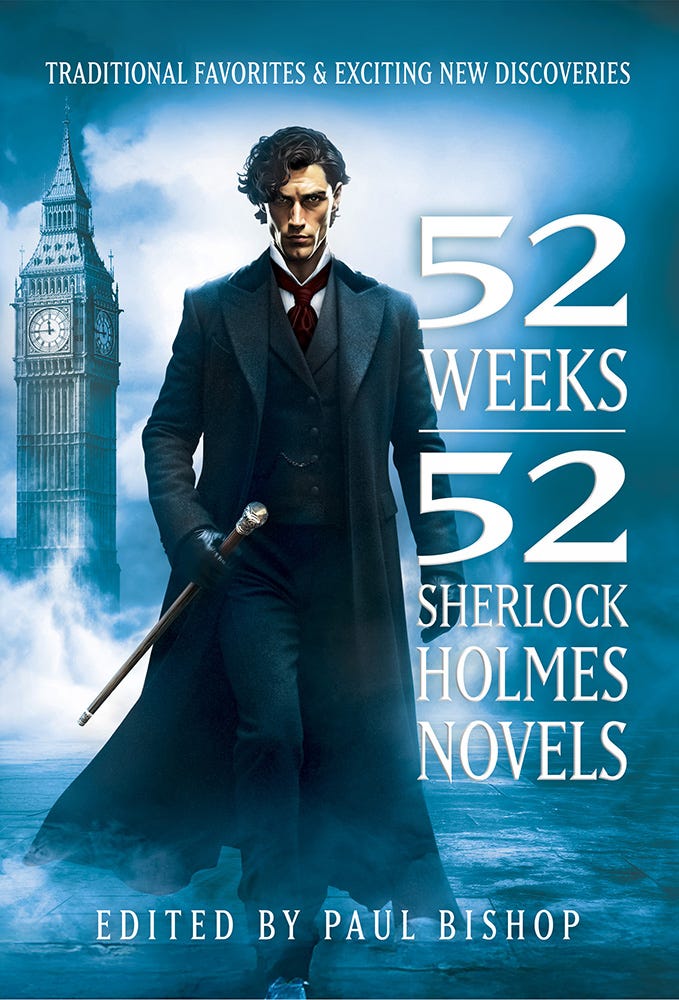THE BLACK SHERLOCK HOLMES
PHILIP R. BROGDON’S SHERLOCK IN BLACK
AND THE LEGACY OF BLACK SHERLOCKIAN FANDOM
The image of Sherlock Holmes is often imagined through a Eurocentric lens, tied to Victorian London, White masculinity, and the British establishment. For decades, the Sherlockian fandom—especially the highly exclusive Baker Street Irregulars (BSI)—reflected this narrow cultural framework. Yet, in 1986, Philip R. Brogdon shattered one of those barriers when he became the first Black American inducted into the BSI, a society that had long been predominantly White. Brogdon’s subsequent work, Sherlock in Black (1995), stands as a significant contribution not only to Holmesian scholarship but also to a more inclusive understanding of fan history. His monograph illuminates a vital, often overlooked, legacy: the deep, rich, and enduring relationship between Black individuals and Sherlock Holmes.
Brogdon’s Sherlock in Black is more than a booklet; it is an archival counter-history that challenges the dominant, White-centered narratives that have traditionally defined Sherlock Holmes fandom. By chronicling the stories, influences, and creative contributions of Black Sherlockians, Brogdon reclaims space within a fandom where people of color have often been marginalized or invisible. His work is a reminder that Black fans have always been present, participating, and shaping the cultural life surrounding Sherlock Holmes.
Central to Brogdon’s project is the idea of Black Sherlockian fandom as a space of belonging, creativity, and historical continuity. For Brogdon and the individuals he profiles, seeing themselves within the Sherlockian tradition was more than a personal curiosity—it was an act of cultural affirmation. He identifies Black actors, writers, musicians, and public figures who either explicitly engaged with Sherlock Holmes or who embodied Holmesian qualities in their professional lives. Among these are prominent names such as Sidney Poitier and Fats Waller, as well as more surprising inclusions like Idi Amin, whose self-styled detective persona in media reflected a fascination with the figure of Holmes, albeit through a controversial and complex lens.
In addition to profiling well-known figures, Brogdon also documented the contributions of amateur Black Sherlockians—fans who produced art, wrote stories, created music, and collected memorabilia. These creations, often overlooked by mainstream fan historians, represent the grassroots vibrancy of Black Sherlockian culture. Brogdon’s archive offers an expansive view of fandom that goes beyond formal societies and into the living rooms, art studios, and community spaces where Black fans have long engaged with the Holmesian mythos on their own terms.
Brogdon’s work anticipated a growing movement in which Black creators have taken ownership of Sherlockian narratives and reimagined them through new cultural lenses. A striking example of this evolution is the Watson and Holmes comic book series, in which both Sherlock Holmes and Dr. John Watson are re-envisioned as Black men navigating modern-day Harlem. The series, created by Karl Bollers and Rick Leonardi, not only updates the classic detective stories with contemporary urban issues but also places Black experiences, communities, and identities at the very heart of Sherlockian storytelling. Watson and Holmes stands as a powerful continuation of the legacy Brogdon sought to illuminate—one in which Black creators and fans actively reshape the Holmesian world to reflect their own realities, concerns, and aspirations.
What makes Brogdon’s work especially significant is that it compels us to ask deeper questions about the intersections of race, identity, and cultural participation. Sherlock Holmes, as a character, is frequently celebrated for his rationality, his keen observational skills, and his outsider status within his own society. For many Black fans, these attributes may resonate in complex ways, aligning with the lived experience of negotiating visibility, exclusion, and intellectual authority within majority-White spaces. Brogdon’s Sherlock in Black, together with works like Watson and Holmes, challenges the assumption that Sherlockian fandom is—or should be—a monolith defined by traditional, White, upper-class collectors. Instead, they illustrate how fans of color have constructed their own Sherlockian identities, sometimes in parallel with, sometimes in resistance to, the established fan structures.
Brogdon’s historical and cultural intervention also raises critical awareness about whose stories are remembered and whose are forgotten in fan communities. His work implicitly critiques the BSI and other similar organizations that, until relatively recently, maintained exclusionary practices that limited full participation by fans of color. By documenting Black Sherlockian history, Brogdon not only filled an archival void but also opened pathways for future generations of diverse fans to see themselves as legitimate, valuable contributors to Sherlockian culture.
Sherlock in Black remains a relatively obscure but essential text in the study of Sherlock Holmes fandom. It provides a window into how race, media representation, and fan identity intertwine, offering an alternative lineage that had been largely absent from the canonical fan histories. Brogdon’s work is both an act of preservation and a call to reexamine the structures of fandom to ensure that they reflect the diversity of those who love Sherlock Holmes.
In the end, Philip R. Brogdon’s legacy as the Black Sherlock Holmes is not just about his personal accomplishments or his status within the Baker Street Irregulars. His true legacy lies in his dedication to making visible the long and meaningful presence of Black Sherlockians. Through his archival work—and in the continued reimaginings like Watson and Holmes—he invites us to expand our vision of what the Sherlockian world can be, ensuring that everyone who finds joy in Sherlock Holmes has a place in the story.
Get the paperback today - 52 Weeks 52 Sherlock Holmes Novels
Prefer the eBook? - 52 Weeks 52 Sherlock Holmes Novels



